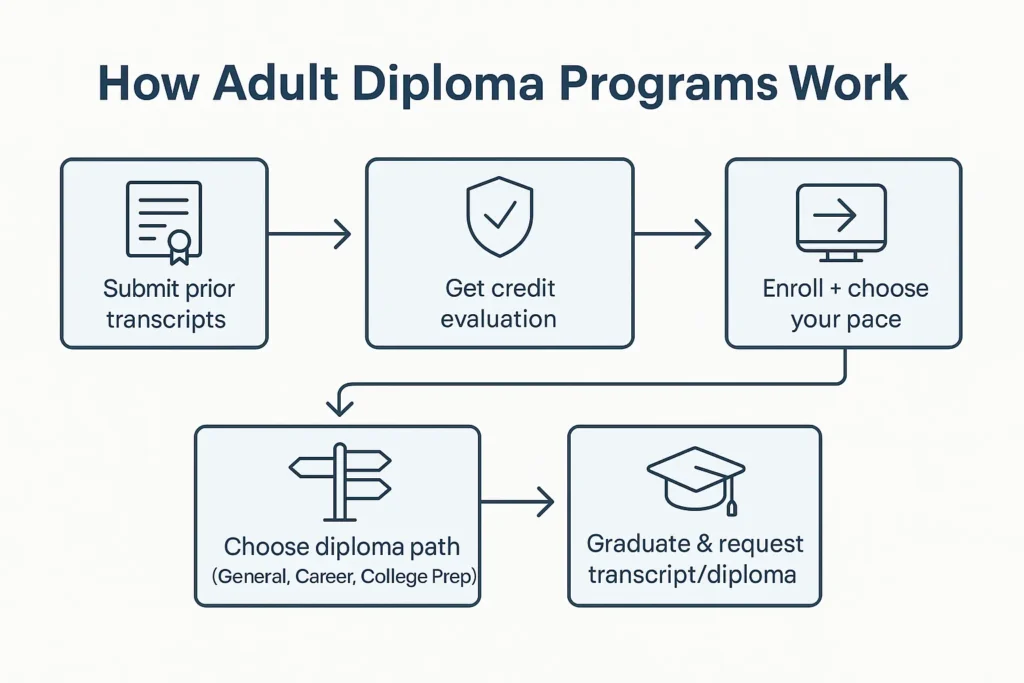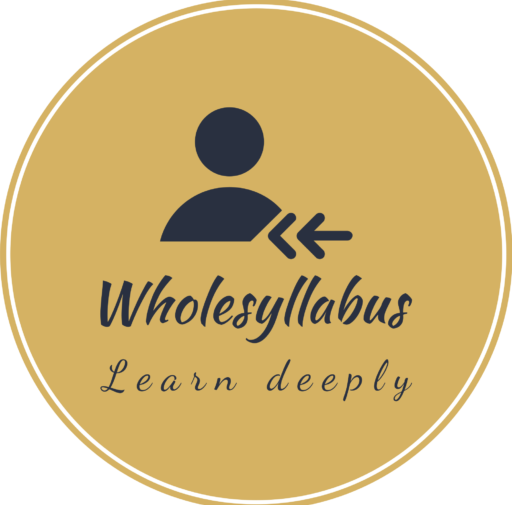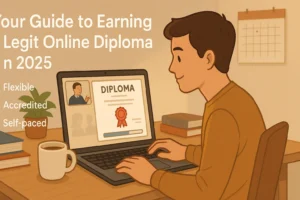Think earning a legit high school diploma online is too good to be true? Over 1.3 million U.S. students are already enrolled in accredited online programs (NCES.gov), proving it’s real and growing fast.
But here’s the catch: accreditation is everything. Without it, your diploma won’t hold up with employers, colleges, or the military. This guide cuts through the noise to show you exactly where to find accredited, recognized online diplomas — with real examples and trusted resources — so you don’t waste time or money on scams.
Let’s dive in.
If you’re a working adult aiming for a degree, check out these flexible online colleges for adult learners.
Quick Overview
What is an online diploma? An online diploma is a high school-level qualification earned via the internet through accredited programs. It’s ideal for students needing flexibility — due to health, travel, or personal goals — and is becoming more accepted by colleges and employers when earned from reputable sources.
Who Should Consider an Online Diploma?
- Students with chronic illness or mental health needs
- Athletes or performers with travel schedules
- Teens in rural areas with limited school access
- Homeschooling families looking for a more structured curriculum
- Students who struggled in traditional schools due to bullying or learning differences
Reddit Tip: A user on r/homeschool shared how their daughter transitioned to an online diploma program after severe bullying — and it helped her regain confidence and get back on track academically.
Recommended Internal Read: How to Homeschool with Online Programs — covers how to use online platforms for full-time learning.
Free Online High School Diploma Options
If you’re looking for a no-cost way to earn your high school diploma online, the good news is—there are legit options out there. But depending on your age and location, the path might look a little different.
Here’s a breakdown of the top free programs worth checking out:
State-Funded Online Public High Schools
Most states now offer tuition-free virtual high school programs for residents. These are typically funded by the state’s Department of Education, and they follow the same academic standards as in-person public schools.
A few examples:
- Connections Academy – Accredited online public school available in 29+ states
- K12.com – Another major provider offering full-time virtual schooling (availability depends on state)
- Local options like Florida Virtual School or Georgia Cyber Academy
Some programs even provide free laptops or tablets, plus internet stipends if you qualify.
These schools are open to school-age teens in most cases, but a few states also let adult learners (18+) enroll to finish high school at no cost. Just check your local state department’s virtual learning options.
Adult High School Completion via Libraries or Community Colleges
If you’re over 18 and never finished high school, don’t overlook library partnerships and community college programs. These often fly under the radar but can be a great alternative to private diploma mills.
✅ Example: The Excel Adult High School program by Gale (in partnership with public libraries) offers a real high school diploma—not a GED—completely free if your library is enrolled.
Other examples include:
- Community College of Denver’s Adult High School Diploma Program (only $50 for Colorado residents)
- Nonprofit education centers or adult learning initiatives tied to local districts
Tip: Just call or visit your local library’s website and search “adult high school diploma”—you might be surprised what’s available near you.
GED as a Free Alternative
Let’s clear this up: A GED is not technically a diploma, but it’s often accepted as an equivalent by most colleges, trade schools, and employers.
So, if earning a full diploma isn’t possible, the GED is a valid, fast-track option—and it’s often free to prepare for.
Free GED prep resources:
- GED.com
- Khan Academy
- Local adult education centers and nonprofit programs
Some states or charities even cover the full cost of the GED exam if you qualify financially.
I found some real advice on Reddit’s r/GED where people shared which free programs helped them most and how they scheduled their exams.
GED vs Diploma – What’s the Difference?
| Feature | High School Diploma | GED (General Education Development) |
|---|---|---|
| Age Requirement | Varies by program (typically 14–21) | Usually 16+ (with withdrawal from school) |
| Course Completion | 4 years of coursework | 4 subject tests (Reading, Math, etc.) |
| College Acceptance | Accepted everywhere | Accepted in most U.S. colleges |
| Time Commitment | 1–4 years | Few weeks to a few months |
| Cost | Free via public programs | Prep often free; test may have a fee |
Paid Online Diploma Programs
Let’s be real—sometimes the free options just don’t cut it. Maybe you want more flexibility, faster graduation, or better support. That’s where paid online high school diploma programs step in. They’re not always cheap, but if you choose right, they can be legit and totally worth the investment.
Private Accredited Online High Schools
If you’re considering a paid route, accreditation is non-negotiable. Without it, that shiny diploma might not be worth the paper it’s printed on.
Some well-known options include:
- Excel High School
- Acellus Academy
- The Keystone School
- Northgate Academy
These schools typically charge between $1,000–$5,000 per year, depending on the number of credits, services, and whether it’s for teens or adults. Most offer monthly payment plans, which is a lifesaver if you’re budgeting.
Here’s what most people miss: Just because a school is online doesn’t mean it’s automatically accredited. Check if the program is recognized by a regional accreditor (like Cognia or AdvancED). You can also search on CHEA.org to verify—although they don’t directly accredit, they list trustworthy agencies.
I’d recommend skimming through the Excel High School FAQ page to get a feel for how things work—tuition, pacing, transcripts, all that jazz.
And yeah, there are cheaper options out there—but you usually get what you pay for.
Adult-Focused Diploma Tracks
This part is especially for adults juggling jobs, parenting, or just life in general.
Many paid programs offer a flexible, self-paced “adult track” that’s made to fit around your schedule. If you’ve earned some high school credits in the past, you can often transfer them and finish faster.
One popular example is Northgate Academy’s “Adult Fast Track” program. It’s self-paced, fully online, and can be completed in just a few months if you hustle. Great for folks who want to move on to college or qualify for a job promotion.
Over on Quora (not linking here directly), people often share how they balanced these programs with full-time jobs. One answer mentioned taking 2 classes per month while working night shifts—and still graduated within 10 months. Pretty inspiring.

If you’re an adult learner, I’d say prioritize programs that offer:
- Credit evaluation (so you don’t repeat classes)
- One-on-one academic support
- Clear graduation timelines
How to Choose the Right Program (Checklist)
✅ Is the program regionally or nationally accredited?
✅ Does it align with your state’s graduation requirements?
✅ Can you transfer credits if needed?
✅ Is it asynchronous (learn at your pace) or synchronous (live classes)?
✅ What support is available (counselors, tutoring, tech help)?
Use this checklist before signing up. I’d recommend emailing the school’s admissions team with your specific questions before committing.
Related Read: Education Online Guide — a breakdown of how online education works at different age levels.
Costs: Free vs. Paid Programs
| Type | Cost | Notes |
|---|---|---|
| Public Online High School | Free | Funded by state, but may have waitlists |
| Private Online High School | $1,000–$10,000/year | More flexible, sometimes better support |
| Adult Diploma Program | Varies | Some are free through nonprofits or states |
Scholarships exist! Some private schools offer aid for low-income students — just ask.
What’s a Day in Online School Really Like?
It varies, but most students report:
- 3–5 hours of focused screen time
- Submitting assignments weekly
- Occasional Zoom sessions or recorded lessons
- More self-discipline needed than traditional school
Real Example: One teen on this Reddit thread said she sets a timer for each subject and takes walking breaks to avoid burnout.
Explore More: Online Courses for Students (Summer Edition) — perfect if you want to test the waters before committing full-time.
Diploma vs GED: What’s the Difference?
- Online Diploma = Fulfills all high school requirements over time
- GED = A test-based credential showing high school-level knowledge
If you’re a teen, go for the diploma. GED is better suited for adults who aged out of school.
College + Career Impact
Most colleges accept online diplomas from accredited schools. So do jobs, military, and trade programs.
✅ Just be sure your transcript is solid: GPA, course rigor, and extracurriculars still matter.
Personal Note: I’ve seen students from online schools get into everything from state colleges to Ivy League — it’s all about how well you use the flexibility.
Helpful Resource: Online Tutoring Jobs for Teens — great for students looking to earn while learning.
FAQs
Q1: What is the fastest way to get a high school diploma online?
If you’re an adult, many schools offer accelerated diploma tracks. For example, Northgate Academy has a “Fast Track” program that lets you finish in as little as 3–6 months if you transfer in prior credits. But speed depends on your pace and past coursework.
Q2: Can I earn a diploma without attending physical school?
Yes! Online high schools—both public (like K12, Connections Academy) and private—allow you to complete coursework entirely online. Some states even provide free devices and internet to enrolled students.
Q3: GED vs Online High School Diploma: Which should I choose?
Here’s the thing—both are valid, but they serve different goals. A diploma is often better for students planning to go straight to college. The GED is ideal if you’re over 18 and want a quicker path to job eligibility. [See our comparison table above.]
Q4: Are free online high schools legit in all states?
Not all states offer free public online high schools, but most do. Check your state’s Department of Education site or visit ConnectionsAcademy.com to find what’s available in your area.
Q5: Is an Online Diploma Legit?
Yes — if it’s from an accredited school. Accreditation ensures colleges and employers will recognize the diploma.
Look for these accreditations:
AdvancED/Cognia
Middle States Association (MSA)
Western Association of Schools and Colleges (WASC)
Final Thoughts: Should You Go for It?
If you need flexibility, independence, and a custom pace — online diploma programs are absolutely worth exploring. Just be smart about picking the right school and stay motivated.
Remember: Online doesn’t mean easier. But it can mean better — if you make it work for you.
Want more tips like this? Check out WholeSyllabus.com — packed with guides for smart, flexible learners.

Nawab, an educator teaching K-12 since 2010, holds an English honors graduate degree and a diploma in elementary education. He has also been blogging for five years, sharing insights for educators and parents.

